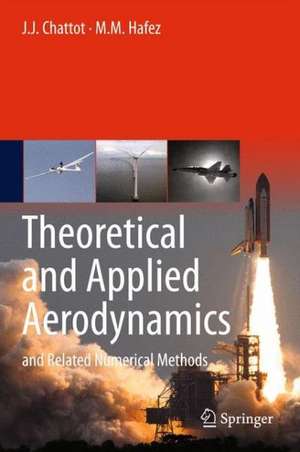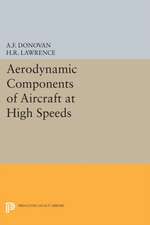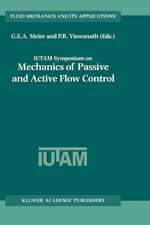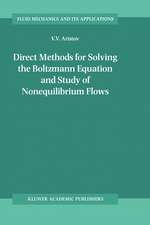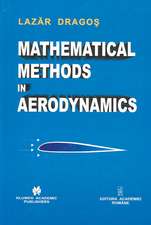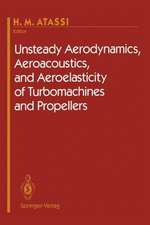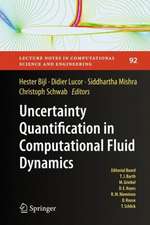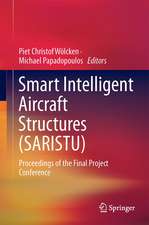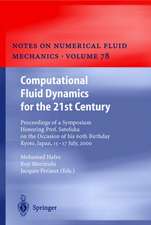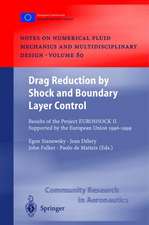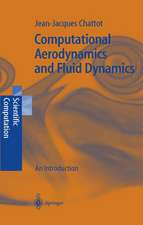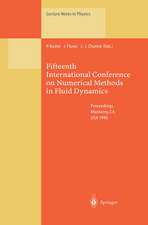Theoretical and Applied Aerodynamics: and Related Numerical Methods
Autor J. J. Chattot, M. M. Hafezen Limba Engleză Hardback – 14 apr 2015
-The classical potential (incompressible) flow theories for low speed aerodynamics of thin airfoils and high and low aspect ratio wings.
- The linearized theories for compressible subsonic and supersonic aerodynamics.
- The nonlinear transonic small disturbance potential flow theory, including supercritical wing sections, the extended transonic area rule with lift effect, transonic lifting line and swept or oblique wings to minimize wave drag. Unsteady flow is also briefly discussed. Numerical simulations based on relaxation mixed-finite difference methods are presented and explained.
- Boundary layer theory for all Mach number regimes and viscous/inviscid interaction procedures used in practical aerodynamics calculations.
There are also four chapters covering special topics, including wind turbines and propellers, airplane design, flow analogies and hypersonic (rotational) flows.
A unique feature of the book is its ten self-tests and their solutions as well as an appendix on special techniques of functions of complex variables, method of characteristics and conservation laws and shock waves. The book is the culmination of two courses taught every year by the two authors for the last two decades to seniors and first-year graduate students of aerospace engineering at UC Davis.
| Toate formatele și edițiile | Preț | Express |
|---|---|---|
| Paperback (1) | 475.93 lei 38-44 zile | |
| SPRINGER NETHERLANDS – 13 oct 2016 | 475.93 lei 38-44 zile | |
| Hardback (1) | 663.93 lei 6-8 săpt. | |
| SPRINGER NETHERLANDS – 14 apr 2015 | 663.93 lei 6-8 săpt. |
Preț: 663.93 lei
Preț vechi: 781.08 lei
-15% Nou
Puncte Express: 996
Preț estimativ în valută:
127.06€ • 132.16$ • 104.89£
127.06€ • 132.16$ • 104.89£
Carte tipărită la comandă
Livrare economică 12-26 aprilie
Preluare comenzi: 021 569.72.76
Specificații
ISBN-13: 9789401798242
ISBN-10: 9401798249
Pagini: 630
Ilustrații: XXI, 620 p. 325 illus., 141 illus. in color.
Dimensiuni: 155 x 235 x 32 mm
Greutate: 1.07 kg
Ediția:2015
Editura: SPRINGER NETHERLANDS
Colecția Springer
Locul publicării:Dordrecht, Netherlands
ISBN-10: 9401798249
Pagini: 630
Ilustrații: XXI, 620 p. 325 illus., 141 illus. in color.
Dimensiuni: 155 x 235 x 32 mm
Greutate: 1.07 kg
Ediția:2015
Editura: SPRINGER NETHERLANDS
Colecția Springer
Locul publicării:Dordrecht, Netherlands
Public țintă
ResearchCuprins
Part I Fundamental Aerodynamics.- Introduction.- Inviscid, Incompressible Flow Past Circular Cylinders and Joukowski Airfoils.- Inviscid, Incompressible Flow Past Thin Airfoils.- Inviscid, Compressible Flow Past Thin Airfoils.- Inviscid, Unsteady Flows past Airfoils.- Flow Past Large and Moderate Aspect Ratio Wings.- Axisymmetric Flows and Slender Body Theories.- Viscous Fluid Flow and Laminar Boundary Layers.- Viscous/Inviscid Interaction Procedures.- Part II Special Topics.- Wind Turbine and Propeller Aerodynamics – Analysis and Design.- Glider and Airplane Design.- Introduction to Hypersonic Flows.- Flow Analogies.- Part III Problems and Solutions.- Problems.- Solutions to Problems Appendix: Special Techniques.
Notă biografică
J.J. Chattot, University of California, Davis, Dept. Mechanical & Aeronautical, Davis, USA
M.M. Hafez, University of California, Davis, Dept. Mechanical & Aeronautical, Davis, USA.
M.M. Hafez, University of California, Davis, Dept. Mechanical & Aeronautical, Davis, USA.
Textul de pe ultima copertă
This book covers classical and modern aerodynamics, theories and related numerical methods, for senior and first-year graduate engineering students, including:
-The classical potential (incompressible) flow theories for low speed aerodynamics of thin airfoils and high and low aspect ratio wings.
- The linearized theories for compressible subsonic and supersonic aerodynamics.
- The nonlinear transonic small disturbance potential flow theory, including supercritical wing sections, the extended transonic area rule with lift effect, transonic lifting line and swept or oblique wings to minimize wave drag. Unsteady flow is also briefly discussed. Numerical simulations based on relaxation mixed-finite difference methods are presented and explained.
- Boundary layer theory for all Mach number regimes and viscous/inviscid interaction procedures used in practical aerodynamics calculations.
There are also four chapters covering special topics, including wind turbines and propellers, airplane design, flow analogies and hypersonic (rotational) flows.
A unique feature of the book is its ten self-tests and their solutions as well as an appendix on special techniques of functions of complex variables, method of characteristics, and conservation laws and shock waves. The book is the culmination of two courses taught every year by the two authors for the last two decades to seniors and first-year graduate students of aerospace engineering at UC Davis.
-The classical potential (incompressible) flow theories for low speed aerodynamics of thin airfoils and high and low aspect ratio wings.
- The linearized theories for compressible subsonic and supersonic aerodynamics.
- The nonlinear transonic small disturbance potential flow theory, including supercritical wing sections, the extended transonic area rule with lift effect, transonic lifting line and swept or oblique wings to minimize wave drag. Unsteady flow is also briefly discussed. Numerical simulations based on relaxation mixed-finite difference methods are presented and explained.
- Boundary layer theory for all Mach number regimes and viscous/inviscid interaction procedures used in practical aerodynamics calculations.
There are also four chapters covering special topics, including wind turbines and propellers, airplane design, flow analogies and hypersonic (rotational) flows.
A unique feature of the book is its ten self-tests and their solutions as well as an appendix on special techniques of functions of complex variables, method of characteristics, and conservation laws and shock waves. The book is the culmination of two courses taught every year by the two authors for the last two decades to seniors and first-year graduate students of aerospace engineering at UC Davis.
Caracteristici
Attractive from an educational view point by using potential flow models and viscous corrections Provides a great balance between theory and numerics Focuses on aircrafts and theories that help estimating the forces and moments acting on them Includes supplementary material: sn.pub/extras
